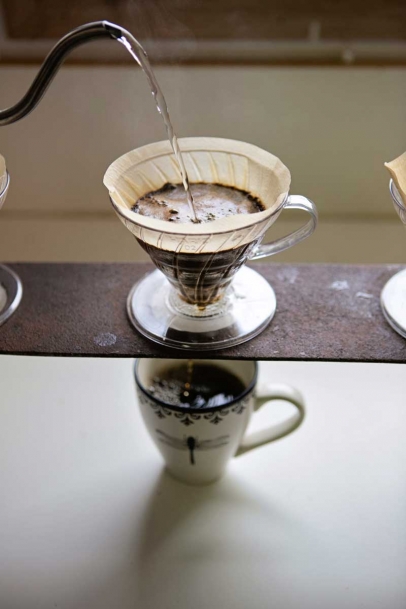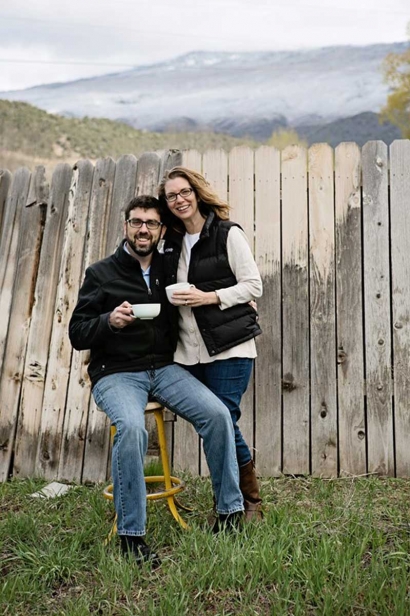Rock Canyon's Cup Runneth Over
One early spring morning this year, I made one of my frequent early—A.M. stumbles (bedhead, pj’s, Uggs…I work from home, what can I say?) to Willits General Store. I was out of coffee again, and as I’m wont to do, I was availing myself of their .82 refill special (BYOC).
I was shocked to discover that the generic robusta beans that usually fill the airpots had been replaced by Basalt’s Rock Canyon Coffee Roasters. Was I dreaming, or had my local gas station actually started sourcing from a local roaster? Sure, I’d seen such a thing occur while living in the Bay Area and Seattle, but rural Colorado?
After amping myself up on Rock Canyon House Blend, I contacted Rock Canyon roaster Craig Fulmer and his wife/“Director of Everything” Heidi Johnson. The couple—three-year Carbondale residents originally from Washington State—moved here for “the quality of life,” as so many of us do. Fulmer, a tech refugee, is a self-professed coffee snob who was “the only person in my dorm with an espresso maker.”
That obsession led to home experiments in roasting with a hot air popcorn popper (yes, really). After literally burning through four of those, Johnson, a retired physical therapist, took pity and purchased a half-pound tabletop roaster for her husband.
In 2012, the couple launched Rock Canyon Coffee Roasters, a micro-roastery “born from the desire to drink something other than burned, bitter coffee,” laughs Fulmer (he’s not a fan of dark Italian roast, which was foisted on America in the 80s with the birth of Starbucks, and what’s known in the industry as the “Second Wave” of coffee. We’re currently in the midst of the “Third Wave.”).
After working out of his 220-square-foot garage for several years, using a five-pound DIEDRICH roaster, it was time to get a legit roastery space. On May 8, Rock Canyon relocated to a 750-square-foot roastery in Basalt’s industrial park in Willits.
On his trusty DIEDRICH (next goal: upgrading to a 25-pound version), Fulmer is roasting 1,000 pounds of beans a month—a variety of organic, Fair Trade, and Rainforest Certified he gets through his importer in Seattle. They’re sold primarily to wholesale accounts, supplemented by customers at the seasonal Carbondale, Basalt, and Eagle Crest farmers’ markets. Of the latter, Fulmer says, “I love to turn people on to coffee, and let them know you can make a great espresso without the fancy equipment. Our goal is to make it accessible and unpretentious.”
“We started out with the idea of just being an online business,” explains Fulmer, who was shipping beans to friends and family across the country. “Being a local roaster wasn’t a goal, especially because when we started our company, I was the fourth roaster in a 44-mile radius.”
Demand equals supply, however, and it’s turned out that the other Roaring Fork Valley roasters have been a supportive community. Equally important is that Rock Canyon didn’t have any desire to open a retail component, and instead filled a void that’s universal in the craft coffee industry: hospitality and food service. While the coffee industry has reached stratospheric success on a retail level, hotels, restaurants, and gas stations are still largely focused on purchasing the cut-rate beans and machines offered as a package by food service distributors.
Rock Canyon has managed to crack that notoriously tough market. Current accounts include Aspen’s Grand Hyatt, ACES, SO café at the Aspen Art Museum, Willits General Store, Hotel Colorado, Whole Foods Roaring Fork Valley, Sweet ColoraDOUGH, Ajax Donuts, and HOPS Culture. Explains Fulmer, “Coffee is a comfort “food”. That’s our ethos, and in conjunction with that, food service coffee doesn’t have to be bad.”
True that. And with the new roastery, Rock Canyon will be starting tours and cuppings (tastings) starting in June (advance registration required; go to their website to sign up). Says Johnson, “We love the current trend toward transparency in craft foods. In the coffee industry, the farmers are toiling in obscurity, and we want to get a dialogue going about sourcing. By offering an educational component in our roastery, we’re able to do that.”






